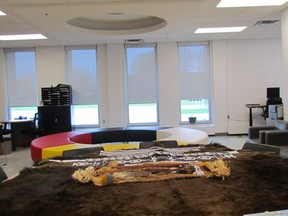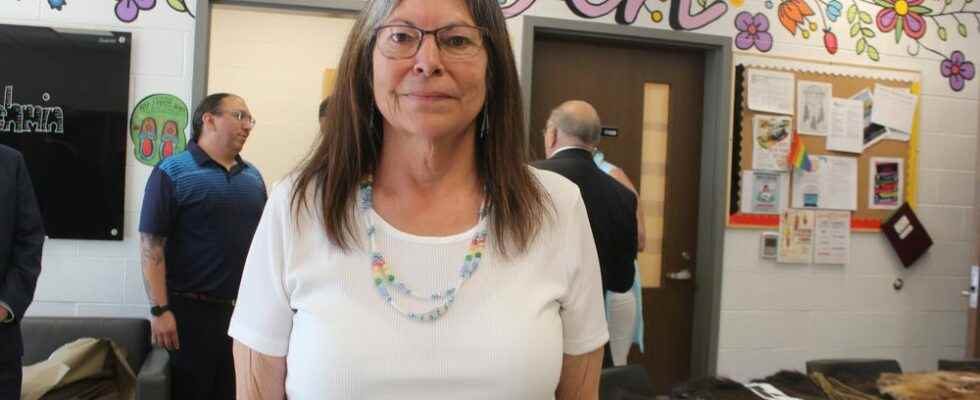
The Den, an Indigenous room at Great Lakes secondary school in Sarnia, is doing what it was designed to do, says Dallas Sinopole with the Lambton-Kent District School Board.
“Our academics are high, our attendance is better and our overall well-being and self-identity is soaring through the roof,” said Sinopole, Indigenous lead with the school board.
“It’s a tremendous opportunity for our kids and they just love this space,” he said. “It’s working, for sure.”
The room is in an addition that opened in 2021 as part of $24.5 million spent turning the former St. Clair secondary school on Murphy Road into the new home of Great Lakes secondary school – created by the merging of St. Clair and SCITS.
Sinopole said more than 100 students at Great Lakes self-identify as Indigenous.

“There’s probably another 50 that we don’t know because, well let’s face it, there’s still a lot of family that are looking for their identity,” Sinopole said.
The room, and programs it provides, help students and families with that process, he said.
An event was held recently at the Sarnia school to officially celebrate the opening of the room that has been named for Kim Henry, an educator for three decades in the community.
“I’m overwhelmed with the whole thing,” said Henry, who recently retired as principal and teacher of the Aamjiwnaang First Nation kindergarten. She has also been a native education worker with the board and a trustee.
Henry, who visits local schools as an Aamjiwnaang elder, said she believes the room is helping students with their self-identity.
“That’s one of the things I’m trying to incorporate, when I come into the schools, is to help the students learn who they are and find out where they want to go in life,” Henry said.
Sinopole said Indigenous rooms at other schools have names “championed” by a local elder. They were looking to do the same at Great Lakes when it was named it for Henry, who is “just a wonderful” member of the community, he said.
The Lambton-Kent District School Board also has Indigenous rooms at North Lambton secondary school in Forest, Alexander Mackenzie secondary school in Sarnia and high schools in Chatham-Kent.
“This room is ultimately a safe place, a safe haven for our students that feel anxious or afraid of the education system,” Sinopole said.
The room at Great Lakes is open each school day and offers academic support three days a week, as well as cultural and Ojibway language support.
It was designed with a medicine wheel in the form of a circular seating open in the center and ventilated to allow for smudging, a tradition involving the burning of natural medicines.
“We can do ceremonies in here and if there are any grievances or any trauma, we can use the space as a talking circle so that we can help students through their sad times and help their spirit move forward,” Sinopole said.
“We try to do our best to teach that history and the culture is tied to education today, and how we can be successful in a way that our students will have those opportunities and pathways forward to go to the next level of education and be successful in life,” he said.
Sinopole said the room and its services “it wouldn’t be what it is” without the support of the school board, its staff and area First Nations.
“We all have a part in creating a space like this for our students,” he said.
June is National Indigenous History Month and the school board is recognizing National Indigenous Peoples Day Tuesday.
This month, the school board’s Indigenous education team has been arranging events and activities for staff and students to learn more about the diversity of Indigenous culture and histories, the board said in a news release.
“We know that as educators and education workers, we have a significant role to play in the reconciliation process to further the knowledge and understanding of Indigenous rights, histories, culture and perspectives amongst students, staff and the community,” said education director John Howitt .
